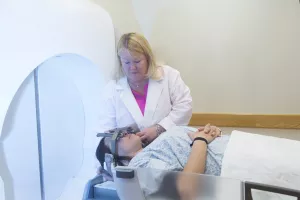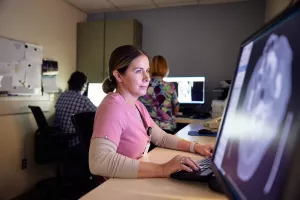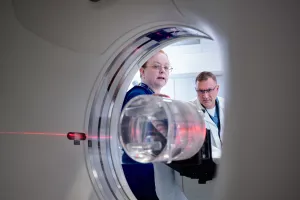Radiation oncology is a medical specialty that uses high-energy radiation to treat cancer and other conditions. We often pair radiation oncology with other methods like surgery and chemotherapy to kill cancer cells and shrink tumors.
How does radiation oncology work?
Radiation oncology, or radiation therapy, is a safe, effective and important part of many treatment paths for people living with cancer. During your treatments, small doses of radiation are delivered to your body with laser-like precision. The radiation produces highly energized ions that help shrink and destroy cancer cells.
If you have questions about your treatment, want to find a support group or just need to talk, know that your care team will be there for you every step of the way.

Conditions
Radiation oncology is a common treatment option for the following types of cancer:
Treatments
Your radiation oncologist will work with your primary care doctor and other specialists to create a wellness plan that's uniquely yours. It's important to remember that radiation oncology treatment can vary based on individual needs and the stage of the cancer.
If radiation therapy is the right treatment choice for your condition, we'll help you schedule a special kind of planning appointment called a simulation. During a simulation, we'll:
- Determine the position your body will be in for your treatments
- Perform a CT scan to examine the treatment area
- Place markings on your skin to pinpoint where the treatments will be delivered
Additional diagnostic studies such as MRI or PET scans may help us determine the treatment area.
Types of radiation therapy
Once we've pinpointed your treatment area, we'll examine your care needs to decide the type of radiation therapy you'll receive, such as:
- Cone beam CT (CBCT)
- Elekta Infinity linear accelerator
- High-dose rate brachytherapy
- Image-guided radiotherapy
- Intensity-modulated radiation therapy (IMRT)
- Oldelft Therapax 3 superficial radiotherapy
- Stereotactic body radiotherapy (SBRT)
- Volumetric arc therapy (VMAT)
Gamma Knife surgery is a minimally invasive way to perform brain surgery without making any incisions. We’re proud to be among the few health systems in Massachusetts and Northern New England to offer Gamma Knife surgery, which lets us operate on the brain using only hyper-focused radiation.
Nutrition plays a very important role in how we treat and manage cancer. Now more than ever, your body needs key nutrients from proteins, carbohydrates and fats to help support its natural functions in the wake of new stressors from cancer treatment. Depending on your specific treatment area you may also need to modify your diet depending on your specific treatment area.
We offer nutrition therapy to help you balance a healthy diet with cancer treatment so your body can:
- Gain its strength by absorbing key nutrients
- Replace and keep body tissues healthy
- Fight infection
- Increase energy

From regular office visits to inpatient stays, find the healthcare you need and deserve close to home.

Meet the doctors and care team devoted to supporting you every step of the way along your path to better health.